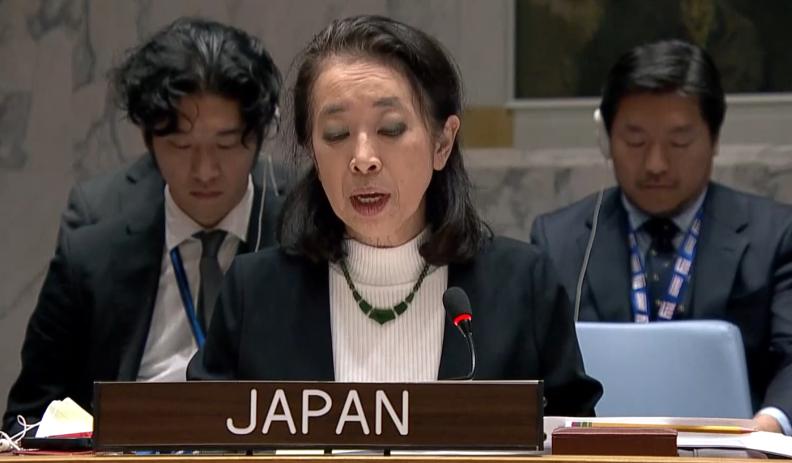テロに関する安保理ブリーフィングにおける志野大使ステートメント
令和5年2月9日

(As delivered)
At the outset, I thank USG Voronkov, Acting Executive Director of the Counter-terrorism Committee Executive Directorate Chen, and Ms. Franziska Praxl, Director of Multilateral Relations for the Global Center on Cooperative Security for their briefings.
ISIL remains a threat to international peace and security, despite its continued losses in leadership. As pointed out in the Secretary-General’s report, the activities of ISIL and its affiliates in the Middle East and in Africa remain of deep concern. In particular, Japan is concerned about the activity of ISIL-Khorasan in Afghanistan. In addition, we agree with the view that it is of vital importance to take steps on counter-terrorism in Africa.
As part of global efforts on counter-terrorism, Japan places particular emphasis on the following three points: (1) addressing the root causes of terrorism and violent extremism, (2) building the capacity of law enforcement officials, and (3) improving counter-terrorism capabilities, including countering the threats of emerging technologies.
First, terrorism is a serious threat to the survival, livelihood, and dignity of its victims, as it targets human security, the main element of which is "freedom from fear”. On top of this, however, terrorism will not be eliminated in a society where the other two elements of human security, "freedom from want" and " the right to live in dignity", are not ensured. Addressing the root causes, such as poverty and inequality, is an essential element of counter-terrorism.
Second, capacity-building for law enforcement officials is critical to prevent and effectively combat terrorism. Japan has provided capacity-building assistance through UN agencies in areas including border control, prosecution, rehabilitation and reintegration (PRR), and maritime security.
Third, the recent development of emerging technologies can enrich people's lives, but at the same time poses a threat to international peace and security. We commend the leadership of India for its timely adoption of the Delhi Declaration at the Security Council Counter-terrorism Committee last year.
Terrorists and violent extremists have proven able to exploit the Internet to recruit and spread propaganda. Multi-stakeholder cooperation is necessary to effectively address this threat. In addition, it is important to take countermeasures against the financing of terrorism through emerging technologies such as crypto assets. Furthermore, the threat of terrorist attacks has increased as Unmanned Aircraft System (drones) related technology has improved.
We will continue to work with the international community to address the threat of terrorism posed by emerging technologies.
These efforts are integral to maintaining the foundation of the “free and open international order based on the rule of law”. The rule of law is a key principle in effective counter-terrorism, and upholding it is essential not only in direct counter-terrorism operations, but also in addressing the root causes through social and economic development assistance.
Japan is determined to continuously work to promote and strengthen the rule of law to maintain international peace and security throughout its two-year term on the Security Council.
ISIL remains a threat to international peace and security, despite its continued losses in leadership. As pointed out in the Secretary-General’s report, the activities of ISIL and its affiliates in the Middle East and in Africa remain of deep concern. In particular, Japan is concerned about the activity of ISIL-Khorasan in Afghanistan. In addition, we agree with the view that it is of vital importance to take steps on counter-terrorism in Africa.
As part of global efforts on counter-terrorism, Japan places particular emphasis on the following three points: (1) addressing the root causes of terrorism and violent extremism, (2) building the capacity of law enforcement officials, and (3) improving counter-terrorism capabilities, including countering the threats of emerging technologies.
First, terrorism is a serious threat to the survival, livelihood, and dignity of its victims, as it targets human security, the main element of which is "freedom from fear”. On top of this, however, terrorism will not be eliminated in a society where the other two elements of human security, "freedom from want" and " the right to live in dignity", are not ensured. Addressing the root causes, such as poverty and inequality, is an essential element of counter-terrorism.
Second, capacity-building for law enforcement officials is critical to prevent and effectively combat terrorism. Japan has provided capacity-building assistance through UN agencies in areas including border control, prosecution, rehabilitation and reintegration (PRR), and maritime security.
Third, the recent development of emerging technologies can enrich people's lives, but at the same time poses a threat to international peace and security. We commend the leadership of India for its timely adoption of the Delhi Declaration at the Security Council Counter-terrorism Committee last year.
Terrorists and violent extremists have proven able to exploit the Internet to recruit and spread propaganda. Multi-stakeholder cooperation is necessary to effectively address this threat. In addition, it is important to take countermeasures against the financing of terrorism through emerging technologies such as crypto assets. Furthermore, the threat of terrorist attacks has increased as Unmanned Aircraft System (drones) related technology has improved.
We will continue to work with the international community to address the threat of terrorism posed by emerging technologies.
These efforts are integral to maintaining the foundation of the “free and open international order based on the rule of law”. The rule of law is a key principle in effective counter-terrorism, and upholding it is essential not only in direct counter-terrorism operations, but also in addressing the root causes through social and economic development assistance.
Japan is determined to continuously work to promote and strengthen the rule of law to maintain international peace and security throughout its two-year term on the Security Council.
